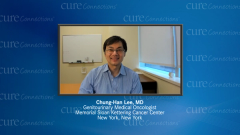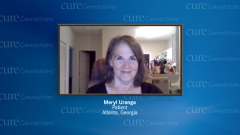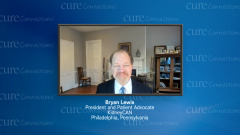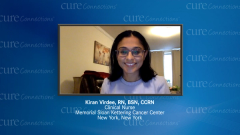
The Importance of Patients Advocating for Themselves During Their RCC Journey
Meryl Uranga describes her path with metastatic clear cell renal cell carcinoma after first treatment, and how it has affected her outlook on her life and future.
Episodes in this series

Chung-Han Lee, M.D.: Ms. Uranga, do want to talk a little more about your journey as a patient, where you are now, and where you see things going?
Meryl Uranga: The beginning was crazy. It was a whirlwind of not knowing what was going on, being told what to do, going through the motions, and shock. I was in my mid-50s. I never expected my life to take that turn. I went through a lot of anxiety and depression. I was really lost and felt like I didn’t have much ahead of me. That has dramatically changed for me. I know the fact that I’m doing well physically has helped, but the psychological side of getting involved in my care and in the community in a support arena, and more than anything, as an advocate [has helped immensely].
Since my diagnosis, I have seen the funding for research go from $0 the year before I was diagnosed to the $60 million that we’re asking to have for the next year. Because of that, I’ve also seen FDA-approved treatments, with one after the other coming out, like was mentioned earlier. It was just a few several years ago. When I was diagnosed, there were a couple more on board. Now we’re talking double digits, 14 or 16, with triplets coming down the road, like you said.
My mental world has improved so dramatically because of the knowledge and empowerment that I have from getting involved, understanding this, and doing my part to make it happen. It’s a small part, a drop in the bucket, but I do whatever I can do. It has changed my whole outlook on my life, my future, and my day-to-day existence. I’m extremely active. I hiked this past weekend. In fact, one of my kids reminded me, “Mom, we went to this place nine years ago and you couldn’t do the hike. And here you are after cancer and 60-plus years old, and you did the hike.”
That’s basically how I see my life now. I don’t take anything for granted. I feel like I’m [helping move things along]. Because of the work that I do with KidneyCAN, I see that’s a reality, that we can keep [making advancements], with new treatments becoming available and the level of research and education.
I was fortunate to be privy to the Kidney Cancer Research Summit this past year, which is hosted by KidneyCAN. That was such a boost as well because there are brilliant minds working on this. There was a day where I’d just sit around thinking, “It’s just not fair. I want to see my grandkids be born,” and now I have two on the way. That actually looks like it’s going to happen. It’s become a totally different world by getting involved. That’s what I’ll share with people who want to hear my story, especially newly diagnosed people who are feeling lost and in that state of mind. Get involved and make things happen. It makes a world of difference on a personal level and in helping the general cause that we’re working toward.
Chung-Han Lee, M.D.: It’s absolutely fantastic how much you’ve gotten involved with this diagnosis. We truly appreciate all your efforts in being an advocate and trying to do all that you can to not only improve your own life but the lives of people in the United States and around the world in terms of advancing the research. The work that you do is truly fundamental in being able to do that.
Meryl Uranga: Circumstances worked out where I was able to retire from my professional career a couple of years ago, so I have the time and the skills. That’s what I’ve said to the people I work with at KidneyCAN and everything. I was a project management professional. I have the skills to help. I was also in media for many years. That’s another thing that I can contribute. I’m [available]. I have the time and the desire to do it because I’m giving back [and expressing] how much this has helped me in my own perspective in living my life. I couldn’t have seen this a few years ago. I was just sitting around waiting for things to go bad, and now I have the opposite view of my life, and I think it’s going to get better.
Chung-Han Lee, M.D.: From a quality-of-life standpoint, as a medical oncologist, this is what we strive for in terms of helping you maintain quality of life and allowing you to do the things that you find important. One of the things that patients sometimes think at the beginning before they’ve started on treatment is that the treatment isn’t working unless they get sick. That’s not what we want for you. There’s often a lot more pushback from the patients about potentially dose reducing and making those modifications to improve their quality of life. I tell my own patients, “I can’t predict how much time I can give you, but whatever I can do to make that time better is incredibly valuable.” How about for you in terms of your own health care team? How frequently are you seeing them now? Who else on the team besides your oncologist is involved in your care when you have questions?
Meryl Uranga: For the last couple of years, it’s mostly been telemedicine. I have very rarely been in person other than the things I have to do in person, such as getting an infusion. They haven’t figured out how to do that from afar. I meet with either my oncologist or one of his nurse practitioners, and I do that about every other infusion. That would be about every six weeks. We check in and talk about future scheduling, how I’m doing, concerns, questions, side effects, etc. I reach out through the portal in between those visits if I need to. I also work with a radiation oncologist who basically manages my brain situation. My oncologist is aware of what’s going on, but my radiation oncologist manages it.
I received great news on that. Because I’ve been treatment-free for over two years with my brain, I’ve been switched over to six-month scans. That was a big celebration in this house because of what it indicated more than anything. I still get the other scans every three months, but the fact that they felt that it was OK to stretch it to twice a year is really good news. I have no medical basis on which to base this on, but it has been ever since I started immunotherapy that I’ve had no activity with the brain. I had five radiation treatments on very small 2- or 3-mm things in my brain that were treated with radiation, SRS [stereotactic radiosurgery] gamma knife. But since immunotherapy, I’ve had zero. I don’t know. It’s anecdotal, but that’s been my experience, and I’ll take it.
Chung-Han Lee, M.D.: We’re very happy for you based on the response that you’ve had and all your contributions to the field in terms of advocacy.
Transcript edited for clarity.








